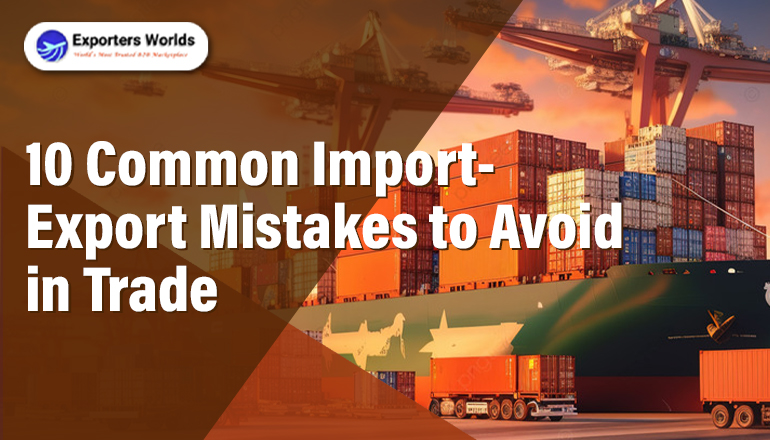Top 10 Import-Export Mistakes to Avoid in International Trade

Internation trade isn’t just moving boxes across borders.
It’s chaos, pressure, deadlines, uncertainty, opportunity—all spinning at once.
One wrong signature and your shipment’s stuck in port for six weeks. One missed clause, and suddenly, your buyer ghosts you after delivery. That’s the real-world drama of import-export. It isn’t textbook clean. It’s battlefield messy.
And it’s the tiny missteps that end up exploding.
We’re not here to throw jargon at you. We're here to walk you through 10 common (but very real) mistakes that silently wreck trade deals every day—and what to do instead.
TLets discuss top 10 Import-Export Mistakes to Avoid in international trade.
At Exporters Worlds, we’ve seen these go wrong. We’ve also helped fix them before they ruin things. Let’s get into it.
1. Thinking Market Research Is Optional
It’s not.
There’s a dangerous assumption exporters make:
"If my product sells here, it’ll sell there."
Nope.
What works in Mumbai may flop in Manchester. The tea you export to Egypt might be irrelevant in Japan. Demand changes shape across borders—fast.
According to the International Trade Centre (ITC), over 52% of SMEs fail in new export markets due to poor understanding of local demand and competition. That’s not a small number.
Fix this:
Use trade data portals like Trademap. Study import stats. Identify local competitors. Ask the ugly questions—What’s the pricing range? Do buyers care about certifications? Is there tariff protection favoring local suppliers?
Exporting without market research isn’t brave. It’s reckless.
2. Sloppy Documentation = Expensive Delays
Exporters get this wrong all the time. Why? Because paperwork feels “minor”—until customs flags it.
You miss the packing list. Or get the invoice address slightly wrong. Or the bill of lading has an outdated HS code.
Result? Shipment held. Sometimes fined. Sometimes rejected. Sometimes returned.
Fact: Documentation errors cause over $70 billion in annual delays globally (World Bank Logistics Report).
Your cargo might move faster by sea—but paperwork doesn’t forgive.
Do this:
Create a pre-shipment checklist. Commercial invoice, packing list, bill of lading, COO, insurance certs—check twice.
Exporters Worlds always advises a second-layer verification system. Because once it’s on water or in the air, your correction window closes.
3. Misjudging Regulations—Because “It Worked Last Time”
Every country has its own strange trade laws.
The US might allow your chemical coating, but the EU could demand REACH certification. You might get away with textile dyes in Africa that are completely banned in Scandinavia.
Don't assume consistency. Regulations change monthly—quietly.
There are over 3,800 product-specific trade regulations across top 20 economies. (WTO)
That’s what you’re up against.
Action step:
Before you export, run your product through the import database of your target country. Engage with a compliance advisor or licensing specialist.
Thinking you’re compliant without proof? That’s how brands lose entire markets overnight.
4. Picking the Cheapest Logistics Partner
You go for the cheapest freight forwarder—and that “savings” turns into a nightmare.
Late pickups. Confused Incoterms. Misrouted cargo.
Worse? No visibility.
If they don’t offer shipment tracking or insurance clarity, don’t expect them to protect your interests.
40% of trade shipment issues arise from poor logistics partner performance. (UNCTAD)
What to do:
Don’t just compare prices. Compare responsiveness, certifications, Incoterm expertise, and delivery guarantees.
Exporters Worlds partners only with verified, performance-backed logistics teams worldwide. Because cheap doesn’t scale. Reliable does.
5. Communicating Like It’s Still 2005
This one’s painfully common.
A Chinese buyer says "yes", but meant "maybe". Your Spanish supplier nods but misses your deadline. You write vague emails assuming they’ll “get it.”
They won’t.
Language barriers, cultural gaps, lack of clear confirmations—this is how deals collapse.
McKinsey reports that poor communication costs global businesses over $37 billion annually. In trade? The damage is amplified.
How to fix this mess:
Write structured emails. Repeat critical points in final summaries. Use signed contracts. Employ translation tools when needed. Overcommunicate.
Because ambiguity is a luxury trade cannot afford.
6. Ignoring Currency Risks—Until It’s Too Late
Currency fluctuations don’t feel urgent. Until they kill your profit margin.
You price a deal at ₹80 to $1. It drops to ₹76 by payment time. That’s a 5% hit—your margin gone, just like that.
Solution?
Use forward contracts. Add currency buffers in quotes. Work with multi-currency payment platforms.
Trade isn’t just about cost. It’s about value protection. Don’t let forex volatility be your silent killer.
7. Wrong HS Code = Instant Trouble
HS codes (those 6–10 digit devils) determine duties, controls, and eligibility.
And yet, most exporters “guess” them.
Guess what happens?
- Your product is taxed higher.
- Or flagged for misclassification.
- Or delayed for “random” inspection.
In 2023, over 13% of customs delays were due to HS code errors. (WCO Data)
Confirm your HS code with a customs broker. Cross-check it on WTO’s tariff lookup tool. Get it right once—and protect every future shipment.
8. Vague Contracts That Invite Chaos
Verbal agreements? No.
WhatsApp discussions? Nope.
PDF with missing clauses? You’re inviting lawsuits.
Contracts must cover payment terms, Incoterms, delivery delays, arbitration clauses, penalties, and liabilities.
Because when things go wrong (and they will), your contract is your only shield.
Exporters Worlds always recommends having a Plan B written into your agreement. What if the buyer delays? What if port congestion hits? Spell it all out.
A strong contract doesn’t guarantee peace. But it guarantees leverage.
9. No Risk Planning = High Risk Business
You depend on one supplier.
One port.
One buyer.
And then—strike.
Flood.
Sanctions.
Your entire chain collapses.
It’s not paranoia. It’s reality.
80% of global companies experienced supply disruptions in 2022. (BCI Report)
Build backups. Source from multiple countries. Buy trade disruption insurance. Simulate worst-case delays before they happen.
Risk isn’t the enemy. Unpreparedness is.
10. Tech Hesitation Will Make You Obsolete
Manual emails. Paper invoices. Excel inventory.
You may think you’re “handling it.” But trade today isn’t forgiving.
Digitization isn’t optional. It’s survival.
You need:
- Real-time order tracking
- Automated compliance checks
- CRM to manage leads
- ERP for inventory and payments
At Exporters Worlds, we’ve embedded digital systems into every layer—from onboarding buyers to cross-checking shipment routes.
Efficiency = fewer errors = more profit. Simple math.
Let’s Wrap This Up
No one plans to fail at Internation trade. But thousands unknowingly walk right into failure every month—by ignoring these exact mistakes.
So here’s your mirror:
- Are you researching before you export?
- Are you securing your margins against forex swings?
- Are your contracts bulletproof or breakable?
- Is your tech game strong—or outdated?
Audit. Adjust. Align.
And if you need a partner who’s already done the heavy lifting—
Exporters Worlds is here. We’ve walked this road. We’ve fixed what others ignored.
Let’s make your trade journey mistake-free and profit-smart.
Reach out. Build smart. Ship global—with confidence.




